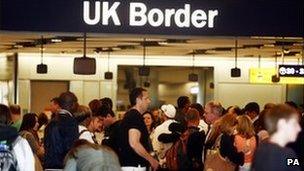Annual net migration to UK falls below 200,000
- Published

Study is the most common reason for immigration into the UK
Net migration levels to the UK have fallen significantly in the past year, official estimates have indicated.
Net migration - the balance between the number of people who come to live in the UK for the long-term and the number who are leaving - fell from 242,000 to 183,000 in the year to March.
The reduction was principally because of a fall in the number of foreign nationals studying in the UK.
The government wants to reduce the annual figure to the tens of thousands.
The Conservatives made reducing net migration a key part of their immigration policy while in opposition.
Provisional data released by the Office for National Statistics on Thursday indicates that net migration in 2011-2 fell to below 200,000 for the first time since 2008-9.
'Tough policies'
Over that period, inward migration to the UK fell by 42,000 to 536,000 - with the number of non-EU nationals settling in the UK falling from 317,000 to 296,000.
The ONS said the fall was "largely due" to a drop in the number of foreign students despite an increase in the number of arrivals from China - the UK's largest overseas student market.
At the same time, the number of people choosing to leave the UK rose from 108,000 to 127,000.
Home Office minister Mark Harper said the latest figures showed the government was bringing immigration "back under control".
"Our tough policies are taking effect and this marks a significant step towards bringing net migration down from the hundreds of thousands to the tens of thousands by the end of this Parliament," he said.
"At the same time, we continue to attract the brightest and best: these figures show that there has been a small increase in the number of sponsored student visa applications for the university sector."
Migration Watch, which campaigns for tighter controls on immigration, welcomed the figures.
"We can now see the first effects of the government's measures to reduce immigration," its chairman Sir Andrew Green said. "There is a distance to go but they are on the right track."
'Economic cost'
The BBC's home affairs correspondent Danny Shaw said despite the lowest inward migration since 2004, the figures suggest the government still has some way to go to meet its goal to reduce net migration to below 100,000 by 2015.
The net migration target has caused some tension within the coalition, with Lib Dems and some Tories - including Mayor of London Boris Johnson - believing it risks send the wrong signals to foreign students and hampering the economic recovery.
And there are warnings that any fall in net migration driven by lower student numbers could come at a "significant economic cost".
"Steps to reduce abuse of the student visa system are welcome but if the government's net migration target is to be met, they also need there to be a dramatic fall in the numbers of genuine students," said Sarah Mulley from the Institute of Public Policy Research.
She said the 26% fall in the number of student visas issued could ultimately prove counter-productive.
"The irony is that the impacts on net migration will only be short-lived because most students stay only for a short time. Reduced immigration today means reduced emigration in a year or two's time, which could see net migration rise again."
The figures come on the same day the Chief Inspector of Borders John Vine warned that thousands of overseas students may have been allowed to stay in Britain illegally because UK Border Agency staff failed to check out tip-offs about them - a backlog of 153,000 had built up at one point, he said.
- Published15 October 2012
- Published25 August 2011
- Published22 November 2012